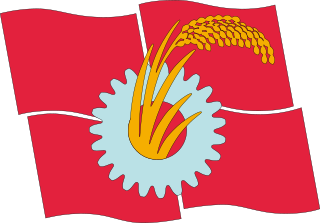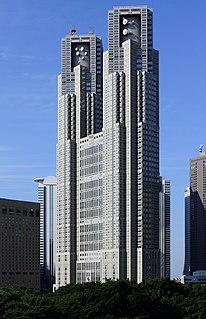
Komeito, formerly New Komeito and abbreviated NKP, is a conservative political party in Japan founded by lay members of the Buddhist Japanese new religions movement Soka Gakkai in 1964. Since 2012, it has served in government as the junior coalition partner of the Liberal Democratic Party. Natsuo Yamaguchi has been the president of the party since 8 September 2009 and currently serves as a member of the House of Councillors in the National Diet, the Japanese national legislature.

The Japanese Communist Party is a political party in Japan and one of the largest non-governing communist parties in the world. The JCP advocates for the establishment of a society based on scientific socialism, communism, democracy, peace, and antimilitarism. It proposes to achieve its objectives by working within a democratic framework while struggling against what it describes as "imperialism and its subordinate ally, monopoly capital". The party does not advocate violent revolution, instead, it proposes a "democratic revolution" to achieve "democratic change in politics and the economy" and "the complete restoration of Japan's national sovereignty", which it sees as being infringed upon by Japan's security alliance with the United States, although it firmly defends Article 9 of the Japanese Constitution and aims to dissolve the Japan Self-Defense Forces, which it considers unconstitutional, due to its opposition of the re-militarization of Japan.
The Japanese political process has three types of elections.
Prefectural elections were held in Tokyo for the city's Metropolitan Assembly on 3 July 2005. The election was a great success for the Democratic Party of Japan which won 16 additional seats, closing in on the Liberal Democratic Party.

The Tokyo Metropolitan Government is the government of the Tokyo Metropolis. One of the 47 prefectures of Japan, the government consists of a popularly elected governor and assembly. The headquarters building is located in the ward of Shinjuku. The metropolitan government administers the special wards, cities, towns and villages that constitute part of the Tokyo Metropolis. With a population closing in on 14 million living within its boundaries, and many more commuting from neighbouring prefectures, the metropolitan government wields significant political power within Japan.
Seiken Akamine is a Japanese politician of the Japanese Communist Party, a member of the House of Representatives in the Diet.
Prefectural elections for the Tokyo Metropolitan Assembly were held on 12 July 2009. In the runup to the Japanese general election due by October they were seen as an important test for Taro Aso's ruling coalition of the Liberal Democratic Party (LDP) and the New Komeito. New Komeito considers Tokyo as an important stronghold and had repeatedly asked Prime Minister Aso to avoid holding the two elections within a month of each other.
The 17th unified local elections in Japan took place in April 2011. In the first phase on April 10, 2011 12 governors, 41 prefectural assemblies as well as five mayors and 15 assemblies in cities designated by government ordinance were elected. In the second phase on April 24, 2011 mayors and/or assemblies in hundreds of cities, cities of Tokyo, towns and villages were up for election. Additionally, a by-election for the National Diet was held in Aichi on April 24.

The Tōkyō proportional representation block, or more formally the proportional representation tier "Tokyo Metropolis electoral district", is one of eleven proportional representation (PR) "blocks", multi-member constituencies for the House of Representatives in the Diet of Japan. It consists solely of the prefecture of Tokyo making it one of two blocks covering only one prefecture, the other being Hokkaido. Following the introduction of proportional voting Tokyo elected 19 representatives by PR in the 1996 general election, and 17 since the election of 2000 when the total number of PR seats was reduced from 200 to 180.
The 16th unified local elections in Japan took place in April 2007. In the first phase on April 8, 2007 13 governors, 44 prefectural assemblies as well as four mayors and 15 assemblies in cities designated by government ordinance were elected. In the second phase on April 22, 2007 mayors and/or assemblies in hundreds of cities, special wards, towns and villages were up for election. Additionally, by-elections for the national Diet were held in Fukushima and Okinawa on April 22.
Politics of Osaka, as in all 47 prefectures of Japan, takes place in the framework of local autonomy that is guaranteed by chapter 8 of the Constitution and laid out in the Local Autonomy Law. The administration is headed by a governor directly elected by the people every four years in first-past-the-post elections. Legislation, the budget and the approval of personnel appointments, including the vice governors, are handled by the prefectural assembly that is directly elected by the people every four years by single-non transferable vote.

General elections were held in Japan on 14 December 2014. Voting took place in all Representatives constituencies of Japan including proportional blocks to elect the members of the House of Representatives, the lower house of the National Diet of Japan. As the cabinet resigns in the first post-election Diet session after a general House of Representatives election, the lower house election also led to a new election of the prime minister in the Diet, won by incumbent Shinzō Abe, and the appointment of a new cabinet. The voter turnout in this election remains the lowest in Japanese history.

General elections were held in Japan on 22 October 2017. Voting took place in all Representatives constituencies of Japan – 289 single-member districts and eleven proportional blocks – in order to appoint all 465 members of the House of Representatives, the lower house of the then 707-member bicameral National Diet of Japan. Incumbent Prime Minister Shinzō Abe's governing coalition of the Liberal Democratic Party (LDP) and the Komeito party retained their seats in signs of what was perceived as weak opposition. The PM won his fourth term in office and held on to the two-thirds supermajority in order to implement policies on revising the war-renouncing Article 9 of the Japanese Constitution.
The Democratic Party, abbreviated as DP, was a political party in Japan. It was the largest opposition political party in Japan from 2016 until its marginalization in the House of Representatives in 2017. The party was founded on 27 March 2016 from the merger of the Democratic Party of Japan and the Japan Innovation Party. The majority of the party split on 28 September 2017, before the 2017 general election, with many its members contesting the election as candidates for the Party of Hope, Constitutional Democratic Party of Japan or as party members without nomination. On 7 May 2018 the DP merged with the Party of Hope to form the Democratic Party for the People.

Yoshiko Kira is a Japanese politician and member of the House of Councillors since 2013, representing the Tokyo at-large district. She is a member of the Japanese Communist Party.
Tomin First no Kai is a regional political party in Tokyo, Japan.

Prefectural elections for the Tokyo Metropolitan Assembly were held on 2 July 2017. The 127 members were elected in forty-two electoral districts, seven returning single members elected by first-past-the-post, and thirty-five returning multiple members under single non-transferable vote. Four districts had their magnitude adjusted in this election to match population changes.

General elections were held in Japan on 31 October 2021, as required by the constitution. Voting took place in all constituencies in order to elect members to the House of Representatives, the lower house of the National Diet. As the constitution requires the cabinet to resign in the first Diet session after a general election, the elections will also lead to a new election for Prime Minister in the Diet, and the appointment of a new cabinet, although ministers may be re-appointed. The election was the first general election of the Reiwa era.

Prefectural elections for the Tokyo Metropolitan Assembly were held on 4 July 2021. The 127 members were elected in forty-two electoral districts, seven returning single members elected by first-past-the-post, and thirty-five returning multiple members under single non-transferable vote. Two districts had their magnitude adjusted in this election to match population changes.
The Constitutional Democratic Party of Japan, commonly abbreviated to CDP, or CDPJ is a liberal political party in Japan.










